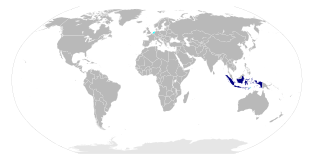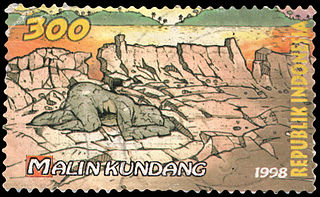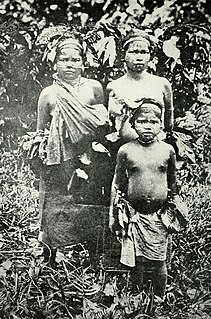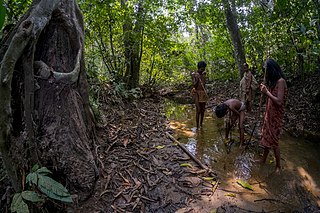
Indonesian is the official language of Indonesia. It is a standardized variety of Malay, an Austronesian language that has been used as a lingua franca in the multilingual Indonesian archipelago for centuries. Indonesia is the fourth most populous nation in the world—of which the majority speak Indonesian, which makes it one of the more widely spoken languages in the world.

Malay is an Austronesian language officially spoken in Indonesia, Brunei, Malaysia and Singapore and unofficially spoken in East Timor and parts of Thailand. It is spoken by 290 million people across the Malay world.

In Indonesian folklore, the Orang Pendek is the most common name given to a creature said to inhabit remote, mountainous forests on the island of Sumatra. The animal has allegedly been seen and documented for at least 100 years by forest tribes, local villagers, Dutch colonists, and Western scientists and travelers. Consensus among witnesses is that the animal is a ground-dwelling, bipedal primate covered in short fur, standing between 80 and 150 cm tall.

Orang Asli are the heterogeneous indigenous population that forms a national minority and also the oldest inhabitants of Peninsular Malaysia.
The Malaysian language or Malaysian Malay, is the name regularly applied to the Malay language used in Malaysia. Constitutionally, however, the official language of Malaysia is Malay, but the government from time to time refers to it as Malaysian. Standard Malaysian is a standard form of the Johore-Riau dialect of Malay. It is spoken by much of the Malaysian population, although most learn a vernacular form of Malay or other native language first. Malay is a compulsory subject in primary and secondary schools.

The Orang Laut are several seafaring ethnic groups and tribes living around Singapore, peninsular Malaysia and the Indonesian Riau Islands. The Orang Laut are commonly identified as the Orang Seletar from the Straits of Johor, but the term may also refer to any Malay origin people living on coastal islands, including those of Mergui Archipelago islands of Myanmar and Thailand, commonly known as Moken.

The Orang Batin Sembilan, Orang Rimba or Anak Dalam are mobile, animist peoples who live throughout the lowland forests of southeast Sumatra. Kubu is a Malay exonym ascribed to them. In the Malay language, the word Kubu can mean defensive fortification, entrenchment, or a place of refuge. It is metaphor for how the majority and dominant Islamic Melayu villagers believe them to use the interior forests as a means for resisting inclusion in the larger Malay social and Islamic religious world. As is the case with other forest peoples in the region, the term Kubu is associated with very negative connotations.
Keris Mas, born Kamaluddin Muhamad, was a prominent Malaysian literary figure and was one of the founders of the Asas '50 literary movement. His numerous contributions to Malay language literature led him to become Malaysia's first National Laureate in 1981.

More than 700 living languages are spoken in Indonesia. These figures indicate that Indonesia has about 10% of the world's languages, establishing its reputation as the second most linguistically diverse nation in the world after Papua New Guinea. Most languages belong to the Austronesian language family, while there are over 270 Papuan languages spoken in eastern Indonesia.

Malin Kundang, also called Si Tanggang and Nakhoda Manis, is a Southeast Asian folktale about retribution on an ungrateful son. A sailor from a poor family, the protagonist sneaks onto a trading ship, eventually becoming rich, marrying a princess, and acquiring his own galleon. On his return to his home village, he is ashamed of his humble origins and refuses to recognize his elderly mother. In retaliation, she curses him, and when he sets sail, he and his ship are turned to stone.
The Duano' are an indigenous people of Malaysia and can be found in islands along the northeastern region of Sumatra, Indonesia where most Duano' people have traditionally lived. They are one of the Proto-Malay group of cultures. Due to their nomadic boat lifestyle, based almost exclusively on fishing and collecting shellfish and crustaceans by using mud-boards, Duano' people are often categorized as Orang Laut, a group that includes the Urak Lawoi’ people and Moken people of the northern region of the Malacca Strait and the Andaman Sea. Although there are similarities in their way of life, they are a separate ethnic group. Citing their own language, culture, identity, and economic complexities, they deny being Orang Laut.

Bukit Tigapuluh National Park - The Thirty Hills - is a 143,223 hectare National Park in eastern Sumatra, consisting primarily of tropical lowland forest, largely in Riau province, with a smaller part of 33,000 ha in Jambi province. It is famous as one of the last refuges of endangered species such as the Sumatran orangutan, Sumatran tiger, Sumatran elephant, and Asian tapir, as well as many endangered bird species. It forms part of the Tesso Nilo Complex biodiversity hotspot. The Park is inhabited by the indigenous peoples of the Orang Rimba and Talang Mamak tribes.

Nicholas Saputra Schubring, known as Nicholas Saputra, is an Indonesian actor and film producer. He first rose to prominence as Rangga in the 2002 hit film Ada Apa dengan Cinta?, a role he reprised in Ada Apa Dengan Cinta? 2 in 2016. He has since established himself as one of Indonesia's most acclaimed actors with two Citra Award wins for Best Actor as the titular character in Riri Riza's Gie in 2005 and Best Supporting Actor in Edwin's Aruna & Her Palate in 2018.

The Senoi are a group of Malaysian peoples classified among the Orang Asli, the indigenous peoples of Peninsular Malaysia. They are the most numerous of the Orang Asli and widely distributed across the peninsula. The Senois speak various branches of Aslian languages, which in turn form a branch of Austroasiatic languages. Many of them are also bilingual in the national language, the Malaysian language.

Bukit Duabelas is a relatively small national park covering 605 km² in Sumatra, Indonesia. It is representative of lowland tropical rain forests in the province of Jambi. Only the northern part of the park consists of primary rainforest, while the rest is secondary forest, as result of previous logging. The park is inhabited by the indigenous Orang Rimba.

The Tidung, Tidong are a native group originating from northeastern part of Borneo and surrounding small islands. They live on both sides of the border of Malaysia and Indonesia.

Mira Lesmanawati or better known as Mira Lesmana is an Indonesian film director, producer and songwriter of mixed Dutch, Javanese and Madurese descent. She is the elder sister of Indonesian jazz musician, Indra Lesmana.
Kubu is a Malayic language spoken in the southern swamps of the island of Sumatra in Indonesia by the Kubu people (Orang Rimba), many of whom are nomadic. There is a degree of dialectal diversity.
The 2nd Annual Maya Awards was an award ceremony honoring the best in Indonesian films of 2013. The ceremony was held in Hotel Umaniara De'Brawijaya, Kebayoran Baru, South Jakarta, on December 21, 2013.

Gordon Lumban Tobing was an Indonesian singer of folk songs, particularly those in the Batak language. Born to a Batak family in Medan, North Sumatra, Tobing moved to Jakarta in 1950 and began working in the entertainment industry. While with Radio Republik Indonesia, he participated in an Indonesian cultural envoy to the 4th World Festival of Youth and Students. Over the remainder of his life Tobing was included in numerous similar envoys, ultimately travelling to five continents.















